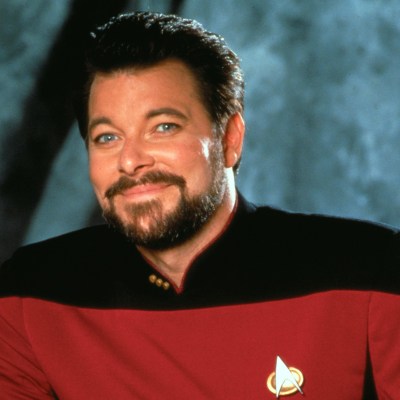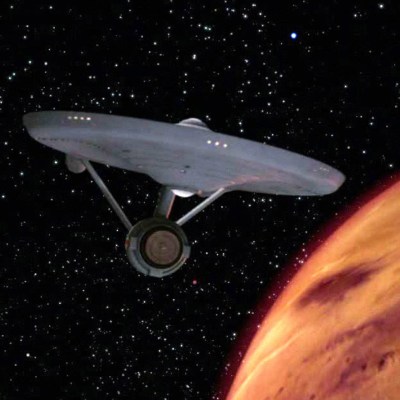Star Trek Generations Should Have Been The Next Generation Finale
Debating about the best and worst Star Trek moments is a geek pastime that will endure until our sun grows cold or to the point where human beings have simply entered into a parallel universe in which Star Trek is real. But the extremes of best and worst lists sometimes exclude the more interesting truth about Star Trek stories; the moments that are just fine. Neither overtly bad nor exceedingly good, the majority of Trek, when you include most of the films, is merely okay. And perhaps the most okay-est of the okay Star Trek movies is the 1994 film Star Trek Generations.
In a way, Generations was the first franchise film of its kind: an event movie at the epicenter of a franchise that boasted three distinct TV series airing different seasons within one year. While by November 1994 it had been three years since a Trek movie had been in the theaters, the Trek brand which greeted Generations’ release was massive. Star Trek: Deep Space Nine had just launched its third season in September; Star Trek: Voyager Season 1 was waiting in the wings for January 1995; and the mainstream public had just completed The Next Generation’s seven-year run in May. This meant only six months separated that TV finale and the TNG cast’s feature film debut.
Yet while looking back at this moment, one could argue that these two storylines should have been swapped. What I’m saying is that TNG Season 7 should have ended with a storyline in the vein of Generations, in which William Shatner’s Captain Kirk dies, and the Enterprise-D is destroyed, and the first TNG film should have been more like the two-part finale, “All Good Things…”
Both scripts were written by the same dynamite Trek duo Ronald D. Moore and Brannon Braga, and it’s utterly unfair to saddle them with this weird observation three decades later. Nonetheless, when you watch the chronological adventures of the Enterprise-D crew, it really feels as though Captain Picard (Patrick Stewart) saving all of humanity from an anti-time paradox should have been the start of a film franchise, and maybe Shatner should have just been a guest star on the TV series. Here’s why today, “All Good Things…” feels more like a movie, and Generations feels more like a long episode. Spoilers ahead.
First of all, I just want to get this out of the way: pretending like pop culture history could have unfolded differently is a barely credible thought experiment in most cases and is only mildly viable in this case for the simple fact that “All Good Things” and Generations were written by the same people around the same time. In fact, to suggest that “All Good Things” and Generations should have been released in reverse order would strangely fit the real-life order in which they were written. Because the film had a longer pre-production timeline, and that timeline was concurrent with the creation of TNG Season 7, the script for Generations was written before the script for The Next Generation finale, even though the releases were the other way around.
“Ron and I were working on the movie for a year,” Braga said in The Fifty-Year Mission, Ed Gross and Mark A. Altman’s oral history of Star Trek. “The script ‘All Good Things’ we cranked out in three weeks.” According to producer Rick Berman in the same book, “Brannon and Ron and I had just written the movie, and they were absolutely wiped out. And then they came up with this wacky idea of the show taking place in three time periods and seeing our characters in the sort of [a] collision of time. It was amazing.”
Most fans agree. “All Good Things…” is generally considered the best Star Trek series finale of all time, and also, according to fans like Marvel boss Kevin Feige, one of the best TV finales in the history of television. When Star Trek: Picard Season 3 staged a reunion for the TNG crew in 2023, an iconic scene in which Picard and the crew play poker together ended the show, just as it had in 1994. The story found Picard moving through the past, the present, and one possible future, and coming face-to-face with longtime nemesis Q (John de Lancie) in an epic showdown about life, the universe, and everything.
Generations also dealt with some timey-wimey action, but interestingly, like “All Good Things…,” sans an actual time machine. While “All Good Things…” suggested that Picard narrowly avoided an anti-time paradox by destroying three versions of the Enterprise in the past, present, and future, Generations found Captain Kirk and Captain Picard teaming up to stop one mad scientist, Dr. Soren (Malcolm McDowell), from destroying one star, which would have wiped out one planet full of 230 million people. In the process of saving the Veridian system, Captain Kirk is killed and the Enterprise-D is half-destroyed and half-crashed.
Let’s look at the numbers: In Generations, one version of the Enterprise is destroyed, but part of it seems kinda salvageable. In “All Good Things…,” three versions of the Enterprise are totally destroyed, one by one. In Generations, Picard and Kirk are trying to save one planet, full of people we never see in the movie, not once. In “All Good Things…,” Q makes Picard realize that the anti-time anomaly will wipe out all of humanity and pretty much the entirety of life everywhere. On paper, clearly, “All Good Things…” has much bigger stakes while Generations feels like a smaller episode. From a certain point-of-view, It’s only the medium that makes Generations a film and “All Good Things…” a TV episode.
Now, the idea that certain Star Trek movies are less-than-great because they just feel like extra-long episodes is a fairly cold take and not unique to Generations. (See: The Final Frontier, Insurrection, The Motion Picture, and Beyond for other examples.)
But, when you start to really unpack a topsy-turvy hypothetical world in which these stories were released in the order they were written, suddenly, a slightly cooler version of the TNG film era emerges. Let’s pretend, just for fun, that Shatner agreed to do The Next Generation finale, and that finale was fairly close to the plot of Generations, but this time, it’s a big TV episode. In a way, this would have been history repeating itself. In 1991, Leonard Nimoy guest starred as Spock on The Next Generation in the episodes “Unification I & II,” which was partially done to promote Star Trek VI: The Undiscovered Country later that year. Shatner doing a TV spot in the TNG finale could have been the passing of the torch moment, which could have made the first TNG film feel like their own adventure.
Plus, if you crash the Enterprise-D for real in the TNG finale, then suddenly, you can have a version of “All Good Things…”—this time a movie with a different name—in which Picard and the crew have just started on a brand-new Enterprise. Yes, the time-spanning story of “All Good Things…” may not have been a mainstream kill-the-bad-guy movie like Generations, but it could have started the TNG film franchise out with an intellectual bang. For one thing, imagine Q on the big screen, and then ask yourself why Q was never on the big screen. Seriously. Why?
But it’s more than just the cool gee-whiz awesomeness of imagining a big-screen version of “All Good Things…” to consider here. The themes of “All Good Things…” feel more suited for a movie, at least in contrast with the themes of Generations. The film is about death. It’s about Picard losing his family in a fire. It’s about Kirk dying, twice. And it’s about Soren and Guinan having been part of something that reflects the nature of time and mortality. Generations also kills the main character of the original Star Trek TV series in addition to the TNG Enterprise herself, a starship that has appeared in more actual hours of Trek than any other version of the ship, ever. In short, Generations feels like the end of something.
By contrast, “All Good Things…” is a story about new beginnings. Crusher and Picard think about admitting their feelings to each other. Riker and Worf vow to make sure their friendship doesn’t become toxic, and famously, Picard ends the show by doing what he’d never done before, sit down and play poker with his crew. Arguably, these themes are too intimate for a film, at least a film that was designed to attract viewers who weren’t interested in The Next Generation. But in retrospect, I’d argue that leaning into worldwide love for TNG was worth the risk. At its peak, The Next Generation had 20 million households watching every week, a figure that so-called “successful” shows today would kill for. We were lucky to get a series finale as good as “All Good Things…” back then. But looking at it now, next to Generations, it feels much bigger and more momentous.
In 1996, with First Contact, the Trek film franchise totally embraced a film that was actually about the TNG crew—and only the TNG crew—and it worked. Before the J.J. Abrams’ reboots, First Contact made $92 million in 1996, making it, at that time, the second most financially successful Trek movie ever, right behind The Voyage Home. But in 1994, Generations only made $75 million, making it about as successful at the box office as The Undiscovered Country, but not nearly as well reviewed.
Nobody sold tickets to “All Good Things…” in 1994, because it aired on the small screen. But when you consider the strong viewing figures for TNG at that time, a Next Generation movie that seemed more like The Next Generation might have done wonders. Generations is by no means a bad Star Trek movie. But had it switched places with “All Good Things…,” the first Trek movie starring Picard and the crew might have gone down as not just one of the best Trek movies of all time, but maybe, one of the best sci-fi movies of the 1990s.
The post Star Trek Generations Should Have Been The Next Generation Finale appeared first on Den of Geek.
From https://www.denofgeek.com/movies/star-trek-generations-should-have-been-the-next-generation-finale/



